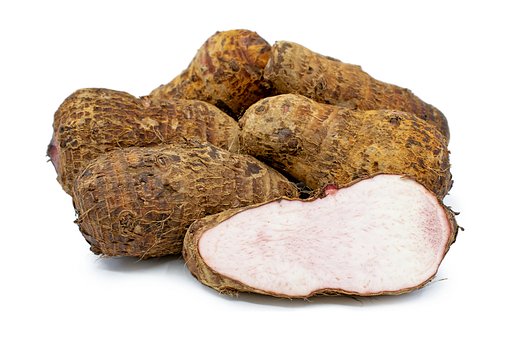Taro root, also known as dasheen or eddoe, is a starchy root vegetable that is a staple food in many parts of the world, particularly in Asia and Africa. It is a member of the Araceae family, which also includes plants such as elephant ear and jack-in-the-pulpit.
The nutritional value of taro root per 100g is quite impressive. One hundred grams of taro root contains approximately:
88 calories
2 grams of protein
0.1 grams of fat
20 grams of carbohydrates
3 grams of fiber
15 grams of sugar
69 milligrams of calcium
1 milligram of iron
30 milligrams of magnesium
30 milligrams of phosphorus
1 milligram of zinc
0.09 milligrams of vitamin B6
1 microgram of vitamin B12
0.2 milligrams of vitamin E
15 micrograms of vitamin K
24 milligrams of vitamin C
47 milligrams of sodium
354 milligrams of potassium.
In addition to these macronutrients and micronutrients, taro root is also a good source of antioxidants and phytochemicals, which can help to protect against disease and promote overall health.
One of the standout nutritional benefits of taro root is its high fiber content. Fiber is essential for maintaining a healthy digestive system, and it can also help to lower cholesterol levels, regulate blood sugar, and promote feelings of fullness, which can aid in weight loss. The high levels of potassium, magnesium and calcium found in Taro Root, also help to regulate blood pressure and promote bone health.
Taro root is also a good source of complex carbohydrates, which provide energy for the body and help to keep blood sugar levels stable. The high levels of Vitamin C found in Taro Root also help to boost the immune system and promote collagen production which are important for healthy skin and hair.
It’s important to note that some people may be allergic to taro root. If you experience any symptoms of an allergic reaction, such as hives, itching, or difficulty breathing, after consuming taro root, you should seek medical attention immediately. Also, people suffering from goiter (thyroid dysfunction) should avoid consuming taro root as it contains substances called goitrogens that can interfere with the functioning of the thyroid gland.
When it comes to incorporating taro root into your diet, there are many different ways to prepare it. It can be boiled, steamed, fried, mashed, or used in soups and stews. Taro root is also a popular ingredient in many traditional dishes, such as the Hawaiian dish called poi, which is made by mashing taro root and mixing it with water.
All in all, taro root per 100g is a healthy and nutritious food that can provide a wide range of health benefits. It’s an excellent source of fiber, vitamins, minerals, and antioxidants. So, it can be enjoyed as part of a well-balanced diet, provided you do not have an allergy or thyroid dysfunction. The taste of taro root can be a little bland, so adding some herbs, spices or seasoning can make it more appealing.

 Home
Home Health
Health Diet & Nutrition
Diet & Nutrition Living Well
Living Well More
More












